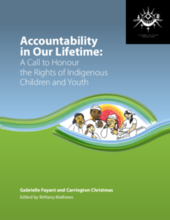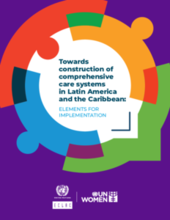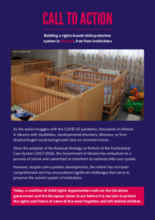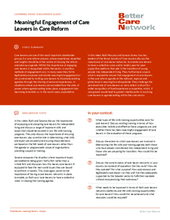Displaying 191 - 200 of 946
For decades, First Nations have called for Canada to respect the sacredness of their children and youth by upholding the best interests of the child, substantive equality and cultural continuity. This call has been echoed in numerous reports including, but not limited to, the Royal Commission on Aboriginal Peoples (1996), the Joint National Policy Review (2000), the Wen: De Reports (2005), the Truth and Reconciliation Commission (2005), A Roadmap to the Truth and Reconciliation Commission Call to Action #66 (2018) and the National Inquiry into Missing and Murdered Indigenous Women and Girls (2019). In June 2020, Bill S-217 (now S-210) was introduced by Senator Rosemary Moodie for the creation of an Office of the Commissioner for Children and Youth in Canada. The Bill proposes the establishment of an appointed Commissioner for Children and Youth to promote, monitor and report on
the implementation of Canada’s obligations under the United Nations Convention on the Rights of the Child.
The DataCare Project seeks to map how EU Member States and the UK currently collect data on the situation of children in alternative care. This report presents the interim findings of this project, based on the analysis of 14 countries who participated in the study at the end of 2020.
This document serves as a guiding framework for those involved in the development of comprehensive national Care Systems as a pillar of social protection in Latin American and the Caribbean. The authors believe that these systems should be designed from a human rights perspective, with particular emphasis on mainstreaming the gender perspective to achieve care models co-responsible between the State, the market, the community, and families, and between men and women.
In line with recent policy discussions on mechanisms to regulate informal kinship care practices, this study aimed to identify how the State could be involved in improving kinship care experience for children.
This new discussion paper produced by UNICEF and Better Care Network elaborates on the extraordinary challenges facing children and families across the globe, and the steps that can be taken to ensure their inclusion in COVID-19 recovery plans.
This call to action - issued by a coalition of child rights organisations including Hope and Homes for Children, Lumos, Eurochild, and SOS Children's Villages - calls on the Ukrainian government and the European Union to "act before it is too late to protect the rights and future of some of the most forgotten and left behind children."
The Council of Europe Action Plan for the Republic of Moldova 2021-2024 is a strategic programming instrument that aims to bring the Republic of Moldova’s legislation, institutions and practice further into line with European standards in the areas of human rights, the rule of law and democracy. The Action Plan is intended to support the country’s efforts to honour its obligations as a Council of Europe member State. The Action Plan aims to support the Republic of Moldova in its efforts to implement the United Nations Sustainable Development Goals (SDGs) of the UN 2030 Agenda for Sustainable Development.
On 20-21 October 2020, the Center for the Study of Social Policy (CSSP) and the University of Houston Graduate College of Social Work (GCSW) held two-day virtual conversations with organizers, activists, scholars, and community leaders to strategize innovative ways to create a society in which the forcible separation of children from their families is no longer an acceptable solution for families in need.
On 20-21 October 2020, the Center for the Study of Social Policy (CSSP) and the University of Houston Graduate College of Social Work (GCSW) held two-day virtual conversations with organizers, activists, scholars, and community leaders to strategize innovative ways to create a society in which the forcible separation of children from their families is no longer an acceptable solution for families in need.
In this video, Ruth Wacuka and Samora Korea, two key leaders of the Kenya Society of Care Leavers, discuss the importance of care leaver networks, to enable care leavers to have a collective voice and to build a peer-to-peer supportive platform that aids in the transition of young people into independent living.







